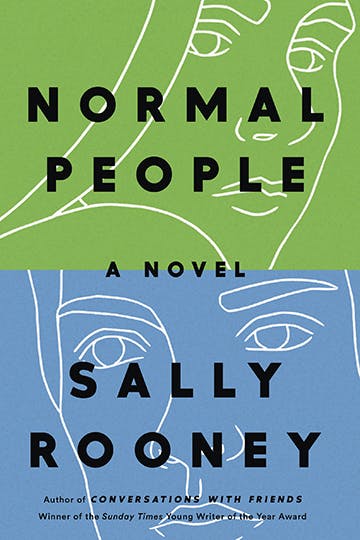
The U.S. Intelligence Community
Toward the end of Sally Rooney’s new novel, Normal People, Connell, an aspiring writer, assures his girlfriend, Marianne, a politics student, that the woman he was speaking with at a party the night before “wouldn’t be remotely my type.” Marianne replies with a banality that she acknowledges as banal: “you can never know another person, and so on.”
Yeah. Do you actually think that, though?
It’s what people say.
What do I not know about you? he says.
Marianne smiles, yawns, lifts her hands in a shrug.
People are a lot more knowable than they think they are, he adds.

True enough, though it depends on who’s doing the knowing, doesn’t it?
In every generation, there are writers who speak for that generation, who bottle some essential current or mode of thinking and being, and arrange it in letters on the page. The 28-year-old Rooney has been hailed, not implausibly, as “the first great millennial author.” Her debut, Conversations With Friends, was as star-making as White Teeth and as zeitgeisty as Less Than Zero. Rooney, who is Irish, has an uncanny sense of how people under 35 talk and text, how they use the internet, how they voice their passionate yet casual Marxism, how it feels to come of age after the 2008 crash. She has a knack for dialogue, a faultless grasp of pacing, and the ability to situate the reader instantly in a place and a feeling. But what makes her a great novelist is her freakish psychological acuity. She has a keen eye for the desires and anxieties expressed in everyday behavior—how someone holds a coffee stirrer, or “presses his hands down slightly further into his pockets, as if trying to store his entire body in his pockets all at once.” Her books are like strangely pleasurable medical exams, in which she opens her characters on the table and goes over their insides with a scalpel.
The word that gets used to describe Rooney’s style is “spare.” Her paragraphs are built for the Instagram age. They are plain as white walls, empty rooms with one beautiful accent, like a potted fern. She brings an early-dawn feeling to the subject of human intimacy—usually portrayed as messy and chaotic—and an analytic philosopher’s interest in clearing away problems, in scrubbing things down to their parts, so that they can be built anew. Her images are striking, and her wit subtle and dry; the reader doesn’t share the jokes as much as she admires them. “Cherries hang on the dark-green trees like earrings,” thinks Connell at one point. “He thinks about this phrase once or twice. He would put it in an email to Marianne, but he can’t email her when she’s downstairs.”
Many good writers and all the great ones have only one story to tell, even if they find different ways of telling it. With Rooney this is especially pronounced. Conversations With Friends was the story of two university students, Frances and Bobbi, who are ex-girlfriends and best friends. They become entangled with a thirtysomething couple, Nick and Melissa; Frances and Nick have an affair. The plot was old—naïve young woman falls in love with broken married man, heartbreak and suffering ensue—but the novel felt entirely new. It’s fitting that Rooney’s subject is love—the thing that has been done countless times by others, but can only be felt by each person as if it were the first time for anyone, because, for that person, it is.
Normal People, too, is the story of first love. Connell and Marianne come from Carricklea, way out in the provinces of west Ireland. She is rich, and he is poor; his single mother cleans Marianne’s house. Marianne is unpopular and brilliant and has been physically and emotionally abused by her family for years. Connell is a popular and good-looking soccer player who reads The Communist Manifesto at night. In their last year of school, they begin a secret sexual relationship that continues, on and off, through their years at Trinity College.
Normal People has the feeling of having been either rushed into publication following the success of Conversations With Friends or a draft for Conversations With Friends. It’s most useful to read them together, as one book or project. The female protagonists in both novels are extremely thin, neurotic geniuses with at least one terrible or outright abusive parent. They physically suffer and seek out forms of pain. They ask men to hit them during sex. Their male love interests are athletic, a little passive, smart enough to understand how smart the women are, and perceptive enough to find them beautiful. They are also handsome—the kind of objective, ridiculous good-looking that, “even covered in blood . . . radiates good health and charisma,” and obviates the need to find any other reason for desiring them. Both books involve close intimacies between a poor person and a rich person. In both, the poor person is recognized as a literary talent and writes a short story, which immediately leads to professional reward and the ascent up a rung in the literary world, while the rich person accepts a more humble fate.
The biggest difference between the two books is that Conversations With Friends is set in the past tense, told by a first-person narrator (Frances), and Normal People is in the present, with alternating third-person narrators. Where one would expect a present-tense narration to be more comedic and quicker, Normal People is slower, and sadder. It gives us no sense of Marianne or Connell in the future, or how their later adulthood inflects their memories. The book doesn’t look back at youth, it looks out from it. Rooney’s interest in this time of life has less to do with the irony that characterizes novels like Sentimental Education or The Age of Innocence and more to do with a sincere and documentary parsing of confusions and discoveries. In some ways, this gives the reader less to hold on to, and the book threatens to slip from memory in much the way that one’s own youth does. The power of Normal People is that, without the presence of a compromised thirtysomething character like Nick, the book speaks entirely without regard for middle age, insisting, rightfully, on the truth of its own time.
Economic anxiety blows like a sharp wind through Rooney’s world. Her characters know they won’t have pensions and that jobs are hard to come by. Frances, who at one point is too broke to buy groceries, is judgmental of Melissa and Nick’s large house and easy lifestyle but admits that she was seduced by them, too. “I wasn’t trying to trash your life,” she tells Melissa in a rare moment of disclosure. “I was trying to steal it.” In Normal People, Connell’s life changes when he wins a scholarship. His rent is paid, and he can afford to take a trip through Europe with his friends. “Suddenly he can spend an afternoon in Vienna looking at Vermeer’s The Art of Painting, and it’s hot outside, and if he wants he can buy himself a cheap cold glass of beer afterward.” How elegantly Rooney interweaves consciousness and place; suddenly the reader is seated in a sunlit café, beverage in hand, feeling the condensation running down the side. Connell steps into a world that had looked like “a painted backdrop,” and he can’t believe it can bear his weight, his inclusion. “That’s money, the substance that makes the world real. There’s something so corrupt and sexy about it.”
In a bildungsroman, the hero is supposed to find his social footing, to be educated into adulthood, and take his place in society. But for many, education means moving out of one world and into a no-man’s land, some kind of limbo. In college, the previously awkward and despised Marianne ably navigates social hierarchies, while Connell flails. Through his connection with Marianne, he is accepted as “rich-adjacent: someone for whom surprise birthday parties are thrown and cushy jobs are procured out of nowhere.” He has nothing in common with these people, and he can’t really speak to them at all. Their parents caused the financial crash. They don’t care about doing the reading or studying. They spout off opinions in class, and stand around comparing their families’ wealth. He won the scholarship, but he doesn’t belong. “I just feel like I left Carricklea thinking I could have a different life,” he says to the college mental health counselor when he crashes into a major depression. “But I hate it here, and now I can never go back there again.”
Rooney is a keen observer of class and its behaviors— Marianne’s creepy boyfriend Jamie gets worked up over drinking champagne out of coupe glasses, which only shows what a Philistine he is. But manners per se are not her concern. Sociological rituals and class behavior provide the background for devastating summations—executions, really—of motive and psychology. “Connell always gets what he wants, and then feels sorry for himself when what he wants doesn’t make him happy,” Marianne thinks. Or this:
Jamie is somehow both boring and hostile at the same time, always yawning and rolling his eyes when other people are speaking. And yet he is the most effortlessly confident person Connell has ever met. Nothing fazes him. He doesn’t seem capable of internal conflict. Connell can imagine him choking Marianne with his bare hands and feeling completely relaxed about it, which according to her he in fact does.
Rooney narrates very plainly, allowing the rhythm of what looks like ordinary speech to build, until she introduces a startling fact or perfect image. Her language is effortless, never overwrought. “The sky is a thrilling chlorine-blue, stretched taut and featureless like silk.” Her descriptions of emotions can be bluntly accurate—“Marianne felt a relief so high and sudden that it was almost like panic”—or evocative—“He carried the secret around like something large and hot, like an overfull tray of hot drinks that he had to carry everywhere and never spill.” She can even make a pathetic fallacy work: “Outside her breath rises in a fine mist and the snow keeps falling, like a ceaseless repetition of the same infinitesimally small mistake.”
“Eventually Nick looked over and I looked back,” she wrote in Conversations With Friends. “I felt a key turning hard inside my body, turning so forcefully that I could do nothing to stop it.” This is perfect, heart-stopping, and simple. We speak all the time in the cliché of someone “unlocking” this or that inside of us. All Rooney has done is take that familiar language and alter it a little, and by doing so, emphasized the passivity of the lock. It’s a small and exact moment, and her novels are filled with ones like it. She writes about sex with the same care and attention and plainness that she writes about everything else. “He touches his lips to her skin and she feels holy, like a shrine.” And then, the words that everyone has said to someone, somewhere, so bare and final: “It’s not like this with other people.”
As an investigation of sexual power dynamics, Normal People goes further, or into more specifics, than Conversations With Friends did. Marianne’s relationship is defined by her desire to submit to Connell, a desire of which they are both aware. At first this manifests as her willingness to keep their attachment secret, to never speak to him in the hallway or tell a living soul about what they do after school hours. (She knew from the start that “she would have lain on the ground and let him walk over her body if he wanted.”) Connell senses immediately that Marianne would never break their confidence, which is both intoxicating and disturbing. Marianne is comfortable in secrecy, which is to say that she is used to being bullied.
In Conversations With Friends, the intensity—the truth—of love is also wrapped up with the woman’s willingness to do anything for the man. “You can do whatever you want with me,” Frances says to Nick. The women show their love by making themselves vulnerable, which puts the man into a bind: Act on it, hit the woman, let her feel how much she will give herself, and you’re a sadist; don’t, and she feels exposed and judged, rejected. When Marianne is not with Connell, she seeks out joyless sexual relationships where she, too, asks men to do whatever they want to her. With unethical actors, her submissiveness provokes cruelty. “She’s conscious by now of being able to desire in some sense what she does not want,” Rooney writes. “The quality of gratification is thin and hard, arriving too quickly and then leaving her sick and shivery.”
Sex creates privacy. It divides the world: the things we do out there, and the things we do in here. But the privacy of Connell and Marianne’s relationship surpasses that usual division. Its privacy is rooted in shame. When, after a juvenile miscommunication, Connell withdraws from the relationship, he pursues something more “normal”—which is to say, something containable, something social. He finds that with Helen, a normal medical student who does normal things: She goes to the gym, posts photos of her friends on Facebook. It’s easy for Connell to walk down the street holding her hand. There are people you would die for and other people that you can live with, and they are not always the same people. Connell’s love for Helen doesn’t cut to his marrow; it leaves him alone.
“Normal” is a word that comes up a lot in Rooney. “Things matter to me more than they do to normal people,” Frances thinks. Rooney imagines neurotics and writers on the one hand, women who want to be hit during sex and don’t eat enough, and on the other, the people who go to work and don’t obsess for hours over whether to send an email. But more is at stake than feeling like you don’t fit in with the jocks. At one point, Bobbi explains to Frances that she’d like to get a job in a university. “I just don’t see you as a small-jobs person,” says Frances. By “small jobs” Frances means “raising children, picking fruit, cleaning.” Such occupations feel like disappointments, comedowns, anti-creative, as opposed to what she had expected—that Bobbi would smash global capitalism, burn bright. Bobbi explains that she’s “just a normal person.” If Frances needs to see her otherwise, that has more to do with Frances than with her.
The history of the novel is full of characters who mature by reconciling themselves to a more limited and circumscribed fate than they had felt entitled to. In interviews, Rooney speaks openly about her discomfort with receiving media attention for writing novels, and her wish that nurses and bus drivers would be profiled, instead. In her books, however, rich characters accommodate themselves to their inability to change the world, and poor characters pursue an artistic vocation with optimism and openness to the future.
Normal People’s version of this moment occurs at a protest against the war in Gaza. Marianne, who is in the crowd, experiences both the desire for revolution and her own disappointment at being no longer able to believe in such revolution. She suddenly grows up.
Marianne wanted her life to mean something then, she wanted to stop all violence committed by the strong against the weak, and she remembered a time several years ago when she had felt so intelligent and young and powerful that she almost could have achieved such a thing, and now she knew she wasn’t at all powerful, and she would live and die in a world of extreme violence against the innocent, and at most she could help only a few people.
The education that all Rooney’s characters undergo involves the embrace of personal attachments. They give up seeing themselves, if they ever really did, as individual agents and accept their dependence on each other. This, in some ways, is the traditional work of the novel—to solve a political conflict through romance—but in Rooney the attachments are unconventional. No one settles on a traditional relationship. Things are open. Her characters are aptly designed for such experiments. They are well-meaning and progressive. If they do unkind things, they have some good reason for it, and they apologize. Her minor characters—villains—might be petty or have bad politics (centrists), but her protagonists lack spite and bile. They are unable to hold a grudge.
Normal People ends sweetly. It’s presumed that Connell will be leaving Dublin for New York, but Marianne, who can’t be more than 21, approaches this departure with gracious nostalgia and generous sangfroid. There is no accusation of betrayal, and we are not permitted to find Connell’s action selfish or cruel. “People can really change one another,” is how the book ends. “You should go, she says. I’ll always be here. You know that.” Rooney’s vision of intimacy and romance is fundamentally redemptive. Her young students have not been ruined by the world, and still believe in changing it—a few people at a time.

 Ethicoin: Securing the Post-COVID-19 Future
Ethicoin: Securing the Post-COVID-19 Future  A Proclamation on National Crime Victims’ Rights, 2024
A Proclamation on National Crime Victims’ Rights, 2024 